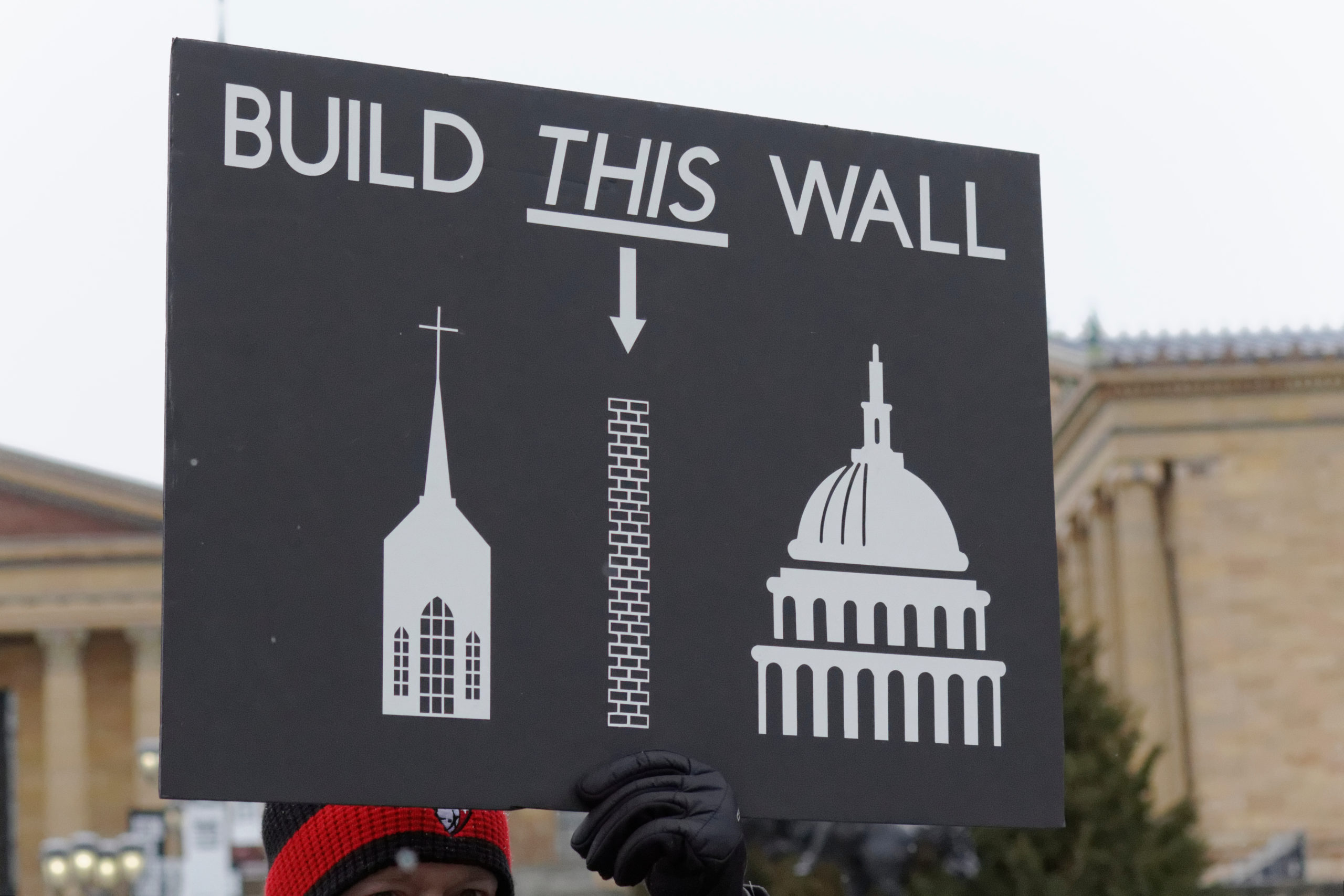Tear Down This Wall
In Kennedy v. Bremerton School District, the Supreme Court can overhaul its unworkable establishment-clause jurisprudence.

The forthcoming Dobbs decision will be the most momentous of the Supreme Court's spring term. But a lesser-known case, Kennedy v. Bremerton School District, provides the Court a chance to make long-overdue changes to its First Amendment jurisprudence, and undermine the "wall of separation" between church and state confected by activist judges in the 20th century.
The case revolves around Joe Kennedy, a one-time assistant coach of the Bremerton High School junior-varsity football team, who would pray at midfield at the conclusion of each game as players commiserated with family. In time, players and even opposing teams would join Kennedy in the postgame prayer.
Fearing a lawsuit, the Bremerton School District instructed Kennedy to cease the public prayers. It offered him access to the press box to pray privately before or after games. Kennedy refused, which garnered widespread media attention. He was subsequently dismissed from his coaching position.
Kennedy sued the school for impeding his free-exercise and free-speech rights. The case percolated through the federal-court system, and, after initially being denied a writ of certiorari, was presented before the Supreme Court in April of this year.
To some, Kennedy's actions represent a revanchist effort to undo decades of progress. Sports Illustrated's Greg Bishop wrote an emblematic piece about the attempt by conservative Christians to use Kennedy's case to "maintain a culture-war strategy" motivated by “white Christian fragility.”
The school district's lawyers offered similar arguments. They claimed that the district "had a compelling interest in not violating the Establishment Clause" and was therefore right in restricting Kennedy's religious expression.
In response, Kennedy's lawyers expressed incredulity at the notion "that even private religious speech by teachers and coaches violates the Establishment Clause." These arguments point to the unworkability of the Court's establishment-clause jurisprudence, stemming all the way back to its 1948 holding in Everson v. Board of Education, which incorporated the establishment clause against the states.
Until the ratification of the 14th Amendment in 1868, controlling Supreme Court precedent held that the limitations on government action outlined by the Bill of Rights applied only to actions and laws passed by the federal government. Since 14th Amendment expressly limited states' ability to restrict due process and other rights afforded under the federal Constitution, the Court began a decades-long project of "incorporating" various provisions in the Bill of Rights against the states, preempting state actions, laws, and constitutions that, in its view, violated provisions of the federal Constitution.
While most of the Bill of Rights' provisions should have been incorporated at the state level, the establishment clause of the First Amendment is different. By its nature, it is a federal provision that resists incorporation against the states. The clause expressly prevents Congress from making laws "respecting an establishment of religion." It does not prohibit the states from doing so. This is made obvious by the fact that several of the states in the Founding era gave aid and granted de facto taxing authority to various Protestant churches—arrangements today's Court would almost certainly deem "establishments."
In Everson, the Court's majority claimed that the establishment clause prohibits both state and federal governments from "set[ting] up a church" or "pass[ing] laws which aid one religion, aid all religions, or prefer one religion over another." This was at odds with the nation's history, particularly that of South Carolina, whose state constitution explicitly recognized the "Christian Protestant religion" as the "established religion of this State." All incorporated churches were required to profess that "the Christian religion is the true religion." In the words of Notre Dame professor Vincent Phillip Muñoz, South Carolina was an "unambiguous example of a founding-era religious establishment."
Since it proscribed state-level "establishments," including all "aid" to religious institutions, in Everson, the Court has had to contort itself in knots to erect what it called a "wall of separation" between church and state. The Court quickly found itself debating, for instance, whether a student-led prayer at a public-school football game constituted an "establishment of religion."
The Court has tried, and failed, to find a sustainable way to incorporate the establishment clause against the states. First, there was the so-called Lemon test, a three-pronged Court-made doctrine to determine whether a state statute or action violates the establishment clause. Then there was Anthony Kennedy's psychological-coercion test, which held that any state action to "coerce" an individual into religious activity, even if that coercion was "subtle and indirect," violated the establishment clause. These rulings have had the effect of stifling religious expression in public and upending the cherished norms and traditions, like public prayer and religious displays, that sustain communities.
Subscribe Today
Get daily emails in your inbox
The most plausible solution comes from Justice Clarence Thomas, who, in a dissenting opinion from the 2004 case Elk Grove v. Newdow, argued that the establishment clause is "best understood as a federalism provision" that "protects state establishments from federal interference but does not protect any individual right." Incorporating the establishment clause against the states, he said, "would prohibit precisely what the Establishment Clause was intended to protect–state establishments of religion."
States in the Founding era were free to establish churches as they liked. They could privilege certain churches over others in their tax regime. They could inculcate faith in their people without fear of federal reprisal. The free-exercise-of-religion and free-speech clauses of the First Amendment have rightly been incorporated against the states and prevent states from limiting the rights of religious minorities.
But as the Founding era demonstrates—and the Kennedy case is a chance to affirm—the "wall of separation" between church and state is more permeable than the Everson Court admitted.